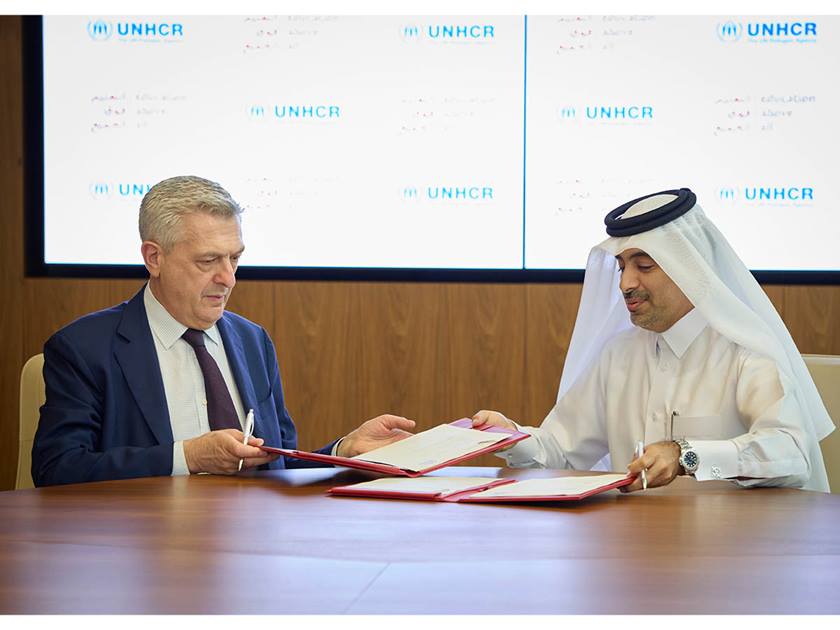
UN High Commissioner for Refugees Filippo Grandi and EAA Foundation CEO Fahad Al Sulaiti sign a new partnership agreement on 28 April in Doha, Qatar. © EAA Foundation/ Aisha Al Musallam
UNHCR, the UN Refugee Agency, and global development organization Education Above All (EAA) Foundation have signed a new, five-year agreement aimed at addressing the global challenge of out-of-school children (OOSC), including refugees, internally displaced people and host community children. The new agreement builds on the success of enrolling more than 1.6 million OOSC in 14 countries globally since 2012.
The strategic partnership agreement signed in Doha by UN High Commissioner for Refugees, Filippo Grandi, and EAA Foundation CEO, Fahad Al Sulaiti, will focus on supporting, promoting, and protecting the right to education for children and youth, especially in conflict-affected countries. The partnership will expand access to quality education for many more vulnerable children worldwide. This initiative aligns closely with Sustainable Development Goal 4, which advocates for inclusive and quality education for all by 2030.
“There are more than 7 million refugee children currently out of school who will be left behind if they do not have access to education,” said Grandi. “This is why Education Above All Foundation’s ongoing commitment to education is so critical to ensure the right to education for all children forced to flee. Together, we are opening doors to new opportunities and brighter futures for refugee children.”
Commenting on the partnership, Al Sulaiti stated: “The alliance between UNHCR and EAA Foundation is a testament to the power of strong partnerships. Together, we have achieved remarkable results. Education knows no boundaries; it is key to unlocking potential and shaping brighter futures for all. Through our joint efforts, we are working to create a world where equality and opportunity in education are more readily available; enriching lives and transforming communities.”
In addition to increased OOSC enrolment, joint projects between EAA and UNHCR have demonstrated varied and significant impact through policy change in a number of countries, increased community resources through the construction of new schools and classrooms, employment opportunities, teacher training, and financial/material support to children and their families. The collaboration has also facilitated sports programmes to boost enrolment and retention, enhance well-being and foster social cohesion and inclusion.
Global advocacy to raise awareness of the importance of education for refugees and promote the accreditation of their qualifications has also been an important component of the partnership.
EAA and UNHCR aim to continue working at scale with impacts reaching beyond core OOSC enrolments to include policy enhancements and improvements in education systems, alongside ongoing advocacy and continued support for the recognition of refugee education qualifications.
The Education Above All (EAA) Foundation is a global foundation established in 2012 by Her Highness Sheikha Moza bint Nasser. EAA Foundation aims to transform lives through education. We believe that education is the single most effective means of reducing poverty, creating peaceful and just societies, unlocking the full potential of every child and youth, and creating the right conditions to achieve Sustainable Development Goals (SDGs).
Through our multi-sectoral approach, unique financing models, focus on innovation as a tool for social good, and partnerships, we aim to bring hope and real opportunities to the lives of impoverished and marginalized boys and girls.
EAA Foundation is comprised of the following programmes: Educate A Child (EAC), Al Fakhoora, Reach Out To Asia (ROTA), Protect Education in Insecurity and Conflict (PEIC), Innovation Development (ID) and Together project.
UNHCR, the UN Refugee Agency, leads international action to protect people forced to flee their homes because of conflict and persecution. UNHCR delivers life-saving assistance like shelter, food and water, helps to safeguard fundamental human rights, and develops solutions that ensure people have a safe place to call home where they can build a better future. We also work to ensure that stateless people are granted a nationality.
Share on Facebook Share on Twitter